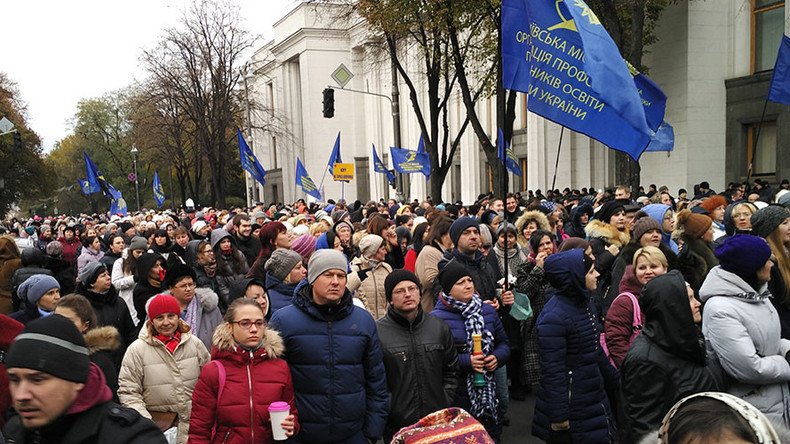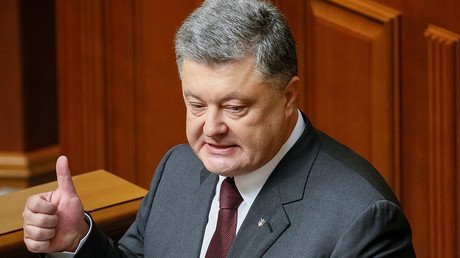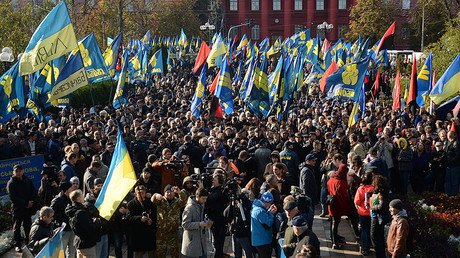‘Corrupt’ Ukraine remains under oligarch influence, reform results ‘fragile’ – EU auditors

The results of EU-backed reforms in Ukraine are “fragile,” while public policymaking is still under heavy influence from vested interests, the body charged with oversight of spending EU budget money reports.
The report by the European Court of Auditors (ECA) gives lukewarm approval for the way European financial assistance was used in Ukraine between 2007 and 2015. It said reform efforts in the country did get some impetus after the dramatic change of the government in 2014, but the progress was limited and the results remain in question.
“EU support for Ukraine remains a work in progress, despite good efforts by the Commission,” said Szabolcs Fazakas, the ECA member responsible for the report. “At the time of our audit, there was a strong political commitment to public administration reform. But management changes jeopardized the reforms and low salaries created openings for corruption. Further steps are needed to meet objectives.”
The report gives a discouraging description of Ukraine both before and after the so-called Maidan events.
“Ukraine has a record of poor economic performance since independence in 1991. Positive economic growth rates in the early 2000s were severely impacted by the 2008 global crisis and have struggled to recover ever since. Ukraine’s state finances have deteriorated over the years, mainly due to mismanagement of public funds. In addition, the revenue side of the state budget is negatively affected by a significant shadow economy.
“Despite reform efforts, Ukraine is still perceived as the most corrupt country in Europe. Vested interests influence public policy-making. Oligarchic clans continue to exert a dominant influence on Ukraine’s economy, politics and media,” the report added.
Corruption is labeled as the biggest threat to foreign support of Ukraine by the sponsors. The perception or Ukraine as a highly-corrupt nation is supported by recurring scandals, including the appearance of President Petro Poroshenko’s name in the so-called Panama Papers, the abundance of cash and luxuries in declarations of property published by Ukrainian officials under EU pressure, or the latest claims by a former Poroshenko ally, who claimed he was involved in rigging parliamentary votes on the president’s behalf.
The ECA evaluated the effectiveness of EU financial support for Ukraine during the audited period, which consisted of €1 billion in grants, half of which was in the form of budget support, and of €3.4 billion in macro-financial loans. The funding is expected to continue as EU provides the €11.2 billion package it promised to Ukraine up to 2020.
Speaking to the press hours ahead of the publication of the report, Fazakas admitted that the EU had no opportunity to analyze the spending of EU emergency aid made by the post-coup authorities in Kiev. He said there was “urgency to save Ukraine” which made scrupulous budget spending verification procedures a secondary objective, as cited by EurActiv.
The report says overall the assistance so far “has been partially effective” in terms of public finance management, fight against corruption and gas sector reform – the three areas that the audit focused on – but recommended reinforcing EU monitoring of the reforms. In particular, “the results of anti-corruption measures remain to be seen,” the report said.
The document praised Kiev for the ongoing rise of gas prices for domestic consumers and aligning its gas sector regulations with those of the EU. However, it said the European Commission should improve monitoring of the Ukrainian gas sector, saying that better “data collection, verification and analysis” is needed for “well-founded evidence-based decision-making.”
The hike in tariffs, including gas, is the biggest instability factor in Ukraine as the rise increases the cost of living while economic slowdown curbs income growth. Kiev is also in conflict with Moscow over standing contracts for supply and transit of Russian gas. Ukraine stopped buying gas directly from Russia, claiming that purchasing from European intermediaries is more beneficial. It also demanded that Russia pay a transit fee several times higher than what the contract states.
Russia is seeking alternative transit routes in the form of the North Stream II and Turkish Stream pipeline projects. It says it may not renew transit contracts with Ukraine after the current one expires in 2019, an outcome that Brussels seeks to prevent.














